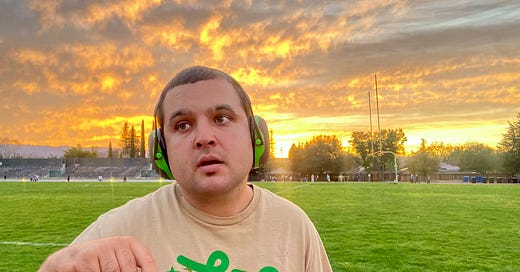No, Autism Is Not "Genetic." It’s Mostly a Transcriptome-opathy.
Let’s stop looking for autism genes and start identifying the other bugs in the program.
My son Jonathan, 26, has nonverbal, profound autism. Like most cases, his autism was not caused by genes, and he likely suffers from a “transcriptome-opathy” that made his brain development go awry.
I just made up a new word. But desperate times call for desperate measures, and this is one of them.
For about three decades science has been in hot pursuit of the causes of autism, with the vast majority of dollars and effort going into genetics.
There was good reason for this “genetics first” approach, as it was called. Autism was clearly highly heritable (a phenomenon detected in the high concordance among identical twins and the high recurrence rate among siblings), so therefore the fault must lie in the DNA, right?
But bold intentions never translated into bold findings. As it turns out the vast majority of autism cases seem unrelated to genetic errors or even what are called “common variants,” which are normally harmless genes that could in some cases predispose someone to a disease or disorder. Depending on which cohort you’re looking at, genes only explain 10-15% of autism cases, with genetics more likely to be at play in the more severe cases.
Side note: my two children with nonverbal, profound autism have not been found to harbor any genetic defects. This is the typical autism scenario.
Research has also found that “maternal factors” or conditions, stressors or exposures to the mother (and therefore the fetus) during or shortly before gestation don’t contribute much to autism risk, though some things like prematurity, perinatal traumas and drugs like anticonvulsants can induce sufficient damage to result in autism.
So if it’s not genes, mutated or otherwise, and not fetal environment, what is it?
There’s a whole other line of research to which we should be paying close attention. This gets a little science-y so bear with me as I try to explain.
Genes are really dumb, passive things. Genes basically hang out as strings of DNA on chromosomes, in the cell nucleus. They don’t really do anything, at least not by themselves.
What makes genes tick is a complicated process of gene expression, or gene regulation if you will. Genes can be turned on and turned off, turned up and turned down. The many different factors that control gene expression are super complicated matters of molecular biology, and I won’t bore you with them (nor can I pretend to understand all of them). But suffice it to say that non-genetic stuff in and around the DNA and the nucleus boss our genes around and them what to do and when to do it.
The end result of all this bossing around is called “transcription.”
Transcription happens when a segment of DNA is opened up and copied into molecules called RNA. The RNA can then encode proteins, or perform other functions that relate to creation and function of bodily tissues. If transcription goes wrong, the protein goes wrong, and the tissue and organ can go wrong.
It turns out that transcription — even in the absence of any genetic mutation — is a really big deal in autism. Perturbed transcriptional pathways are seen broadly in autism studies, but I must point out a scientific owie here. Researchers can’t biopsy autistic kids’ brains. Getting at the process of early brain development is really super hard and requires creative thinking.
So most studies of transcription in autism are based on non-brain tissues from patients, like a cells in blood sample that are converted through some petri dish magic into neural tissues, or on post-mortem autism brains where decedents have donated their brains to science.
Despite the methodological limitations these studies have consistently found that weird things are happening in the transcriptional processes in autism brains. For example, impaired pathways related to proper excitatory/inhibitory (E/I) balance in the brain. A very cool recent study out of UCSD found dysregulated cell proliferation and accelerated neurogenesis and growth. Greater dysregulation was associated with more severe symptoms in the young patients.
It’s time to stop conceiving of autism as a “genetic” disorder and instead consider it (for the most part) a “transcriptome-opathy” — my newly minted word. But it’s not enough to simply study the phenomenon of dysregulated transcription. The far more important question is, why?
What are the factors, especially toxicological factors, that are inducing these bizarre transcriptomic disruptions?
These bugs in the program are unlikely to have spontaneously arisen in the early embryo. Rather they are more likely to be found in the parents’ germ cells which then conferred their heritable material unto the offspring. And those bugs, in my view, could very well be induced by a history of exposures that could cause such mayhem.
I have written and presented a lot about this idea and will not broken-record about it now. But this strikes me as an obvious next wave for autism research.
Autism is a transcriptome-opathy. Now let’s figure out why.
More at jillescher.com.




genetic mutations cause transcription problems and enviromental toxcins can cause genetic mutations
its still genetic, it's wildly heterogenous, but it's genetic
This claim doesn't make much sense. Gene expression is primarily a function of genomic accessibility which is mostly a function of a dynamic interaction between the genome and development cues anticipated by the genome.
Additionally, there have been enormous efforts to find things like "maternal effects" on ASD outcomes. The latest and best work shows these associations are familial confounding, meaning these effects don't exist.
If the process of neurodevelopment was so sensitive to diffuse exposures from the environment, it would be quite hard for the genome to faithfully reproduce typically neurodevelopment >95% of the time.